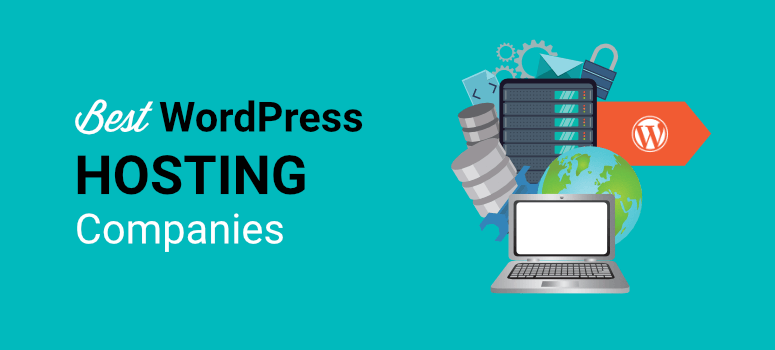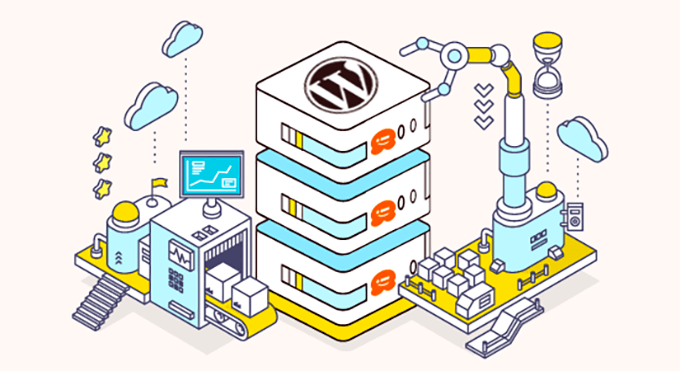SiteGround and Bluehost are among the best WordPress hosting providers. They offer excellent performance, security, and support.
Choosing the right WordPress hosting is crucial for your website’s success. SiteGround and Bluehost provide top-notch performance, ensuring fast loading times. Both hosts offer robust security features, safeguarding your site against threats. Their customer support teams are responsive and knowledgeable, ready to assist with any issues.
These hosts also come with user-friendly interfaces, making site management easy, even for beginners. With competitive pricing and reliable uptime, SiteGround and Bluehost stand out as premier choices. Evaluate your specific needs, such as storage and traffic, to pick the best fit. A reliable host can significantly impact your website’s growth and user experience.

Credit: www.isitwp.com
Introduction To WordPress Hosting
WordPress is the most popular content management system (CMS). It’s user-friendly and highly customizable. But to get the best out of WordPress, you need the right hosting. This blog post will guide you through the essentials of WordPress hosting.
Why Choose WordPress Hosting?
Choosing the right hosting is crucial for your website’s performance. WordPress hosting is optimized specifically for WordPress sites. Here are some key reasons to choose WordPress hosting:
- Speed: Servers are configured to enhance WordPress speed.
- Security: Enhanced security features to protect your WordPress site.
- Support: Expert support teams knowledgeable in WordPress.
- Updates: Automatic updates to the WordPress core and plugins.
Types Of WordPress Hosting
There are different types of WordPress hosting. Each type has its advantages. Here’s a breakdown of the main types:
| Type | Features | Best For |
|---|---|---|
| Shared Hosting |
|
Small blogs and personal websites |
| Managed Hosting |
|
Business sites and high-traffic blogs |
| VPS Hosting |
|
Growing sites and eCommerce stores |
| Dedicated Hosting |
|
Large businesses and high-traffic websites |
Key Features To Look For
Choosing the best WordPress hosting can be challenging. It is important to focus on key features that ensure your website runs smoothly. Here are the essential features you should consider:
Speed And Performance
Speed and performance are crucial for your WordPress site. A fast site keeps visitors happy and helps with SEO. Look for hosting providers that offer:
- High uptime guarantees
- Fast loading times
- Content Delivery Networks (CDN)
Use a CDN to deliver content quickly. Ensure your hosting provider uses SSD storage. SSD storage is faster than traditional HDD storage.
Security Measures
Security is vital for any website. Choose hosting that offers strong security measures. Important security features include:
- SSL certificates
- Regular backups
- Malware scanning and removal
SSL certificates protect your data. Regular backups ensure you can restore your site. Malware scanning keeps your site safe from threats.
Customer Support
Good customer support is essential. Problems can arise at any time. Ensure your hosting provider offers:
- 24/7 support
- Multiple support channels (chat, phone, email)
- Knowledgeable and helpful staff
24/7 support means help is always available. Multiple support channels give you options. Knowledgeable staff can solve issues quickly.
Top WordPress Hosting Providers
Choosing the right WordPress hosting provider is crucial. It impacts your site’s performance, security, and reliability. Here, we will explore the top WordPress hosting providers. Each offers unique features suited for different needs.
Provider 1 Overview
Provider 1 is known for its excellent uptime and customer support. They offer various plans to suit different budgets. Their features include:
- 24/7 customer support
- Free SSL certificates
- Daily backups
- High-speed performance
Provider 1 also offers an easy-to-use control panel. This makes managing your WordPress site a breeze.
Provider 2 Overview
Provider 2 is perfect for beginners. They offer one-click WordPress installation and beginner-friendly tools. Their key features include:
- Free domain name
- Automatic updates
- Free email accounts
- SSD storage
Provider 2 ensures your site is always fast and secure. Their drag-and-drop website builder simplifies site creation.
Provider 3 Overview
Provider 3 is ideal for high-traffic websites. They offer scalable solutions and advanced security features. Key offerings include:
- Content Delivery Network (CDN)
- DDoS protection
- Custom caching solutions
- Free site migration
Provider 3 focuses on performance and reliability. Their expert support team is always ready to help.
Managed Vs. Unmanaged Hosting
Choosing the right WordPress hosting is essential for your website’s performance. One key decision is between Managed and Unmanaged Hosting. This choice impacts your site’s speed, security, and ease of management.
Pros And Cons Of Managed Hosting
Managed Hosting means the hosting provider handles most technical tasks. This includes updates, backups, and security.
| Pros | Cons |
|---|---|
|
|
Pros And Cons Of Unmanaged Hosting
Unmanaged Hosting gives you full control over your server. You handle updates, security, and backups yourself.
| Pros | Cons |
|---|---|
|
|
Cost Considerations
Choosing the best WordPress hosting involves many factors. One key factor is cost. Understanding the price can help you make an informed decision. Here, we break down the cost considerations into two main categories.
Budget-friendly Options
If you are on a tight budget, budget-friendly hosting options are available. These plans usually offer good performance at a lower cost. Here are some popular budget-friendly hosting providers:
- Bluehost: Starting at $2.95 per month
- HostGator: Starting at $2.75 per month
- SiteGround: Starting at $3.95 per month
These plans typically include:
- Free SSL certificate
- Basic security features
- Customer support
Bluehost offers a free domain for the first year. HostGator provides a flexible month-to-month billing option. SiteGround is known for its excellent customer support.
Premium Hosting Plans
For those who need more features, premium hosting plans are the way to go. These plans offer enhanced performance and additional benefits. Here are some top premium hosting providers:
| Provider | Starting Price | Key Features |
|---|---|---|
| WP Engine | $25 per month | Daily backups, free CDN, and premium themes |
| Kinsta | $30 per month | Google Cloud infrastructure, 24/7 support, and free migrations |
| Flywheel | $15 per month | Staging sites, nightly backups, and malware removal |
WP Engine provides daily backups and a free CDN. Kinsta uses Google Cloud for top-notch performance. Flywheel offers staging sites for easy testing.
In choosing a hosting plan, consider your budget and needs. Both budget-friendly and premium options have their benefits. Make sure to select a plan that best fits your requirements.

Credit: veppa.com
How To Migrate Your WordPress Site
Migrating your WordPress site can be a daunting task. With the right steps and tools, it can be smooth and stress-free. Let’s walk through the process together, from preparation to post-migration checks.
Preparation Steps
Before migrating, you need to prepare your site. Start by backing up your data. Use tools like UpdraftPlus or BackupBuddy to create a full backup.
Next, check your site’s current performance. Use tools like Google PageSpeed Insights to note your site’s speed and performance.
Also, ensure your new hosting environment meets your site’s requirements. Check for the PHP version, MySQL version, and available storage.
Finally, inform your users about the migration. This helps avoid confusion or downtime complaints.
Migration Tools And Plugins
There are several plugins to help migrate your site easily. Here are some popular ones:
- All-in-One WP Migration: This plugin simplifies the migration process. It supports full-site export and import.
- Duplicator: A powerful tool that creates a package of your site. It includes both the site files and the database.
- WP Migrate DB: This plugin exports your database as a MySQL data dump. It can handle serialized data.
Choose a plugin that suits your needs. Follow the plugin’s instructions to migrate your site.
Post-migration Checklist
After migrating, you need to check your site. Here’s a checklist to follow:
- Test Your Site: Visit different pages to ensure they load correctly. Check for broken links and missing images.
- Update DNS Settings: Ensure your domain points to the new hosting server. This step might take up to 48 hours.
- Check Permalinks: Go to the WordPress dashboard. Navigate to
Settings > Permalinksand re-save them. - Review Plugins and Themes: Ensure all plugins and themes are active and working. Update them if necessary.
- Monitor Site Performance: Use tools like Google Analytics to track site performance. Compare it with your pre-migration data.
Following these steps ensures a smooth transition. Enjoy your new hosting environment!
Common Issues And Troubleshooting
Hosting a WordPress site can be challenging. Common issues often arise, affecting your site’s performance. Proper troubleshooting can save you time and keep your site running smoothly. Below are some common problems and their solutions.
Downtime Solutions
Downtime can hurt your site’s reputation. Here are some solutions to minimize downtime:
- Monitor uptime: Use tools like UptimeRobot to check your site’s status.
- Choose reliable hosting: Opt for hosts with a strong uptime record.
- Backup regularly: Regular backups can help you restore your site quickly.
Use a Content Delivery Network (CDN) to distribute content globally. This reduces load times and can help prevent downtime. Always keep your plugins and themes updated.
Performance Optimization
Improving your site’s performance can enhance user experience. Here are some tips:
- Optimize images: Use tools like TinyPNG to compress images.
- Leverage browser caching: Enable caching to speed up load times.
- Minify CSS and JavaScript: Reduce file sizes for quicker loading.
Consider using a caching plugin like WP Super Cache or W3 Total Cache. These plugins can significantly boost your site’s speed. Keep your database clean by removing unnecessary data.
Security Fixes
Security is crucial for any WordPress site. Here are some essential security measures:
- Use strong passwords: Ensure all passwords are strong and unique.
- Update regularly: Keep WordPress, themes, and plugins updated.
- Install security plugins: Use plugins like Wordfence or Sucuri.
Always use an SSL certificate to encrypt data. Regularly scan your site for vulnerabilities and malware. Limit login attempts to prevent brute force attacks.
By addressing these common issues, you can improve your WordPress site’s reliability and performance.
Future Trends In WordPress Hosting
WordPress hosting is evolving rapidly. Staying updated is crucial for website owners. This section explores future trends in WordPress hosting.
Emerging Technologies
New technologies are shaping WordPress hosting. Artificial Intelligence (AI) and Machine Learning (ML) are gaining prominence. These tools enhance security and performance.
Edge Computing is another game-changer. It reduces latency by processing data closer to the source. This ensures faster load times and better user experiences.
Integration of Blockchain technology is also on the rise. Blockchain enhances data security and transparency. This is crucial for e-commerce websites.
Predictions For 2024
In 2024, we expect several trends to dominate WordPress hosting. Below is a table summarizing these predictions:
| Trend | Impact |
|---|---|
| AI and ML | Enhanced security and performance |
| Edge Computing | Reduced latency and faster load times |
| Blockchain | Improved data security and transparency |
We will see more Managed WordPress Hosting solutions. These services offer automatic updates and backups. This reduces the burden on website owners.
There will be a focus on Green Hosting. Companies will use renewable energy sources. This reduces the carbon footprint of hosting services.
Expect an increase in Headless WordPress setups. This approach decouples the front-end and back-end. It offers more flexibility and faster content delivery.
In summary, the future of WordPress hosting is exciting. Emerging technologies and new trends will provide better performance, security, and sustainability.

Credit: www.wpbeginner.com
Frequently Asked Questions
What Is The Best WordPress Hosting?
The best WordPress hosting offers high speed, reliability, and excellent customer support.
How To Choose WordPress Hosting?
Choose WordPress hosting based on performance, security, and customer reviews.
Is Managed WordPress Hosting Worth It?
Managed WordPress hosting is worth it for better performance and security.
Can I Migrate My WordPress Site?
Yes, many hosts offer free migration services for WordPress sites.
What Features Should WordPress Hosting Have?
WordPress hosting should have daily backups, SSL certificates, and fast load times.
Is Cheap WordPress Hosting Reliable?
Cheap WordPress hosting can be reliable but check for good reviews and support.
Conclusion
Choosing the best WordPress hosting is crucial for your website’s success. Consider speed, reliability, and support when making your decision. Investing in a quality host can improve site performance and user experience. Make an informed choice and watch your website flourish.
Your WordPress journey starts with the right hosting.








